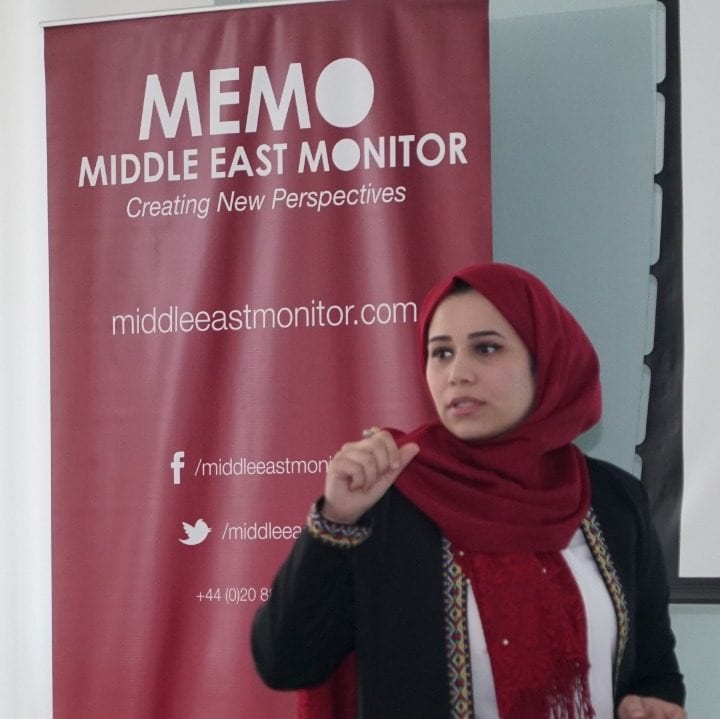After decades of seeing Israel as an enemy state and refusing to establish diplomatic, economic or other ties with it, Arab countries are now signing peace deals with the occupation state. In 2020 four countries agreed to normalise relations with Israel, and many more are said to have softened their stance towards it to allow for some economic, commercial, cultural, sporting, security, military or even social ties.
The normalisation of relations between Arab states and Israel does not change the fact that it is Palestinians, not other Arabs, who are living under occupation and who suffer daily oppression and persecution as a result of the occupation. Palestinians living around the world are also affected by the ongoing Israeli abuses.
“Under normalisation, Israel seeks to erase us from the diaspora as well as our people in the occupied land. There is a clear Zionist movement in the world that seeks to disconnect Palestinians from their homeland. They also work to affect our existence in Brazil, Latin America and elsewhere. They prevent us from even stepping on Palestinian land as tourists, returning to Palestine, residing in Palestine, or even visiting relatives in Palestine,” Ualid Rabah, the president of the Palestinian Arab Federation of Brazil (FEPAL), tells MEMO.
OPINION: How did Latin America react to Israel’s latest onslaught on Gaza?
According to Rabah, the process of “normalisation” didn’t happen by chance, but is a process imposed on Palestinians in an effort to end their national project.
In short, Rabah explains, Arab countries legalise the occupation, ethnic cleansing, colonisation and apartheid through normalisation. “This process is taking place at the expense of the Palestinian people. These regimes are recognising the Apartheid regime of Israel. They are recognising the ongoing process of ethnic cleansing,” Rabah adds
A message from Maynara Nafe, Youth Secretary of FEPAL and Palestinian, to our friends around the world fighting for the liberation of Palestine.#freepalestine #palestina @maynafe pic.twitter.com/L0sJIeqCir
— Instituto Brasil-Palestina (@Ibraspal) July 9, 2022
“Israel and its allies seek to take advantage of the agreements in their ongoing campaign to legitimise the occupation and distract the minds of those who stand in solidarity with the Palestinian cause outside Palestine. For us, as Palestinians in Latin America, they won’t succeed!”
Efforts to normalise ties with Israel, Rabah explains, are nothing in comparison to the work being carried out in support of the Palestinian cause in Brazil. “What really matters is what we are doing for our Palestine in the diaspora. If we build institutions, lead campaigns, spread awareness and knowledge, and keep our national cause alive in the diaspora. We, in Brazil, are doing our part increasingly with more commitment, more lucidity and more results.”
Rabah is also confident that the world is moving now against the occupation of Palestine, against the apartheid regime promoted by the Zionist colonial elite, against its crimes, against its violations of human rights. Therefore, the movement of protest against Israel is much bigger than any normalisation process. “While these regimes ‘normalise’ with Israel, the International Criminal Court (ICC) opens an investigation against Israel for crimes against humanity, war crimes and persecution of the Palestinian people.”
Arab players expressed their great solidarity with the Palestinian people and their firm rejection of normalization with apartheid 'Israel' by refusing to face Israeli players at the World Championships during August 2022. pic.twitter.com/rgTsjzhUv6
— V PALESTINE 🇵🇸 (@V_Palestine20) August 23, 2022
Economically, Trade and economic normalisation between Israel and the Arab countries has grown significantly in recent years. According to the data from the Israeli Central Bureau of Statistics, exports of Israeli goods and services to MENA markets are estimated at a total of about $7 billion annually, including more than $1 billion to the Gulf Arab countries.
Meanwhile, the Chilean Senate called for solidarity with the Palestinian people by boycotting companies that support the Israeli occupation and boycotting products that come from illegal Israeli settlements. In July 2020, the Chilean Senate approved a resolution calling on the government to enact legislation that would ban all Israeli settlement products and prohibit companies involved in the Israeli occupation from benefiting from any agreement or bid signed by Chile.
Another incredible month for the #AbrahamAccords! Trade ties broke even last month's records, and June saw many exciting developments in the innovation, diplomatic and academic spheres!
Check out @Peace_Accords June Newsletter for all the latest info!https://t.co/zSSZsa9J0f https://t.co/7d79QpYetZ pic.twitter.com/Vy4pvIh6GT
— Asher Fredman אשר פרדמן (@fredman_a) July 3, 2022
Since 2020, the UAE and Bahrain were amongst a number of Arab countries – as well as Sudan and Morocco – which normalised ties with Israel. The agreements with Israel were undoubtedly meant to further the interests of the four countries. However, regional cooperation between Israel and the Arab world could have disastrous consequences on the Palestinian people in the occupied territories and in the diaspora.
In spite of this, Rabah warns that the most prominent challenge facing Palestinians in Latin America is division. “How do Palestinians want to build a homeland if they are divided into ‘two governments’?” he asks. “If they don’t understand each other, how can they achieve a national unity state?” According to Rabah, the occupation is taking advantage of the Palestinian division to promote normalisation with the Arab world.
This could be weakening the Palestinian cause regionally, but not globally.
The views expressed in this article belong to the author and do not necessarily reflect the editorial policy of Middle East Monitor.


![Palestinians in Brazil [Ualid Rabah/Middle East Monitor]](https://i0.wp.com/www.middleeastmonitor.com/wp-content/uploads/2022/08/279388215_769071271132332_1370366557264164591_n.jpg?fit=1080%2C720&ssl=1)









